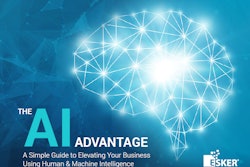
IBM has introduced a new integrated supply chain suite, embedded with Watson AI and IBM Blockchain. The suite is open to developers and is intended to help organizations make their supply chains smarter, more efficient and better able to make decisions to adjust to disruptions and opportunities.
The IBM Sterling Supply Chain Suite is built on the market-leading foundation of Sterling B2B Network and Sterling Order Management, enables manufacturers, retailers and other types of businesses to integrate critical data, business networks and supply chain processes while capitalizing on the benefits of emerging technologies. The supply chains are designed to learn from experience, creating greater reliability, transparency and security while providing new competitive advantages.
With this launch, IBM is delivering a secured, open platform with hybrid-cloud support that enables organizations to integrate their own data and networks and the ones of their suppliers and customers with the Sterling Supply Chain Suite. This flexibility enables enterprises to update and tailor their supply-chain solutions to meet business needs.
"Supply chains are now mission-critical systems for all businesses to drive success and profitability," said Bob Lord, Senior Vice President, Cognitive Applications and Developer Ecosystems, IBM. "Many organizations have risen to the top of their industries by building efficient and agile supply chains. By modernizing supply chains on top of open, hybrid-cloud platforms and infusing Watson AI, IBM Blockchain and IoT into their networks, the IBM Sterling Supply Chain Suite can help companies across all industries enter a new era of global competitiveness.''
Current IBM Sterling clients include Adidas, AmerisourceBergen, Fossil, Greenworks, Home Depot, Lenovo, Li & Fung, Misumi, Parker Hannifin, Scotiabank, and Whirlpool Corporation.
"The complex, global nature of our omni-channel operations presents a significant supply chain challenge that could be turned into a business opportunity, if the right technology is applied," says Juan Andres Pro Dios, CIO, El Corte Ingles. "The IBM Sterling Supply Chain Suite provides open development capabilities that let us quickly tailor solutions to meet our unique business needs. This allows us to embrace operational complexity while optimizing operational performance and improving omni-channel customer experiences."
The Importance of Open, Trusted Collaboration
IBM believes the global economy is becoming more reliant on collaboration, and need to be transparent in order to succeed.
"Optimizing individual supply chain functions and processes has helped enterprises progress as far as they can,'' said Simon Ellis, Vice President, IDC. ''But the growing complexity of global supply chains continues to increase beyond the capabilities of traditional or legacy systems."
Innovations include:
- Trusted connectivity built to scale, backed by IBM Blockchain. The IBM Sterling Supply Chain Suite provides frictionless, secured connectivity and collaboration with customers, partners and suppliers. Enterprises can quickly leverage IBM Sterling's existing multi-enterprise business network, a community of more than 800,000 preconnected trading partners executing 3 billion transactions a year.
- Real-time intelligence and actionable recommendations. Applications and control towers, embedded with AI and trained in supply chain, provide end-to-end visibility, real-time alerts and recommendations that can be automated for self-correcting actions to drive better business outcomes. Clients using individual Sterling applications, such as IBM Sterling Fulfillment Optimizer with Watson, in their supply chains today have lowered shipping cost per order by an average of 7 percent. IBM has also deployed these Sterling capabilities in its own global supply chain to reduce disruption mitigation time from days to hours, becoming 95 percent more efficient at tackling recurring supply chain challenges.
- Open to developers to create tailored solutions. The IBM Sterling Supply Chain Suite allows systems integrators and developers to build, extend and integrate tailored supply chain solutions that can interoperate with other business networks and applications. It also enables clients to bring in third party data, so that all connected applications and networks can benefit from it. The Suite's Developer Hub provides a global community of developers, open-source programs and a library of knowledge resources to help quickly solve unique supply chain challenges.
- Hybrid-cloud integration to extend existing supply chain investments. Instead of requiring time-consuming and expensive migrations, the Suite's enterprise-ready containerized software, along with IBM Cloud Paks, allows clients to extend the value and reach of their legacy applications and data. This hybrid approach means clients have the freedom to choose where to run their workloads and the ability to link them to value-added services in the IBM Sterling Supply Chain Suite. For example, once certified, IBM Sterling Order Management containers for Red Hat OpenShift will allow clients to continue to run their software in their own datacenter – or in any cloud.
















